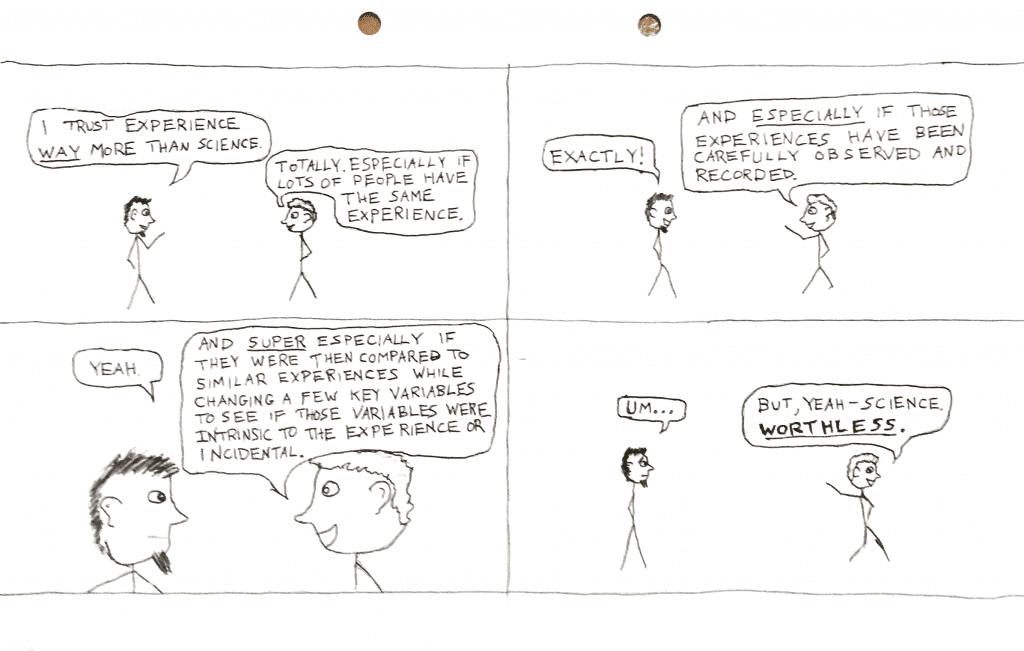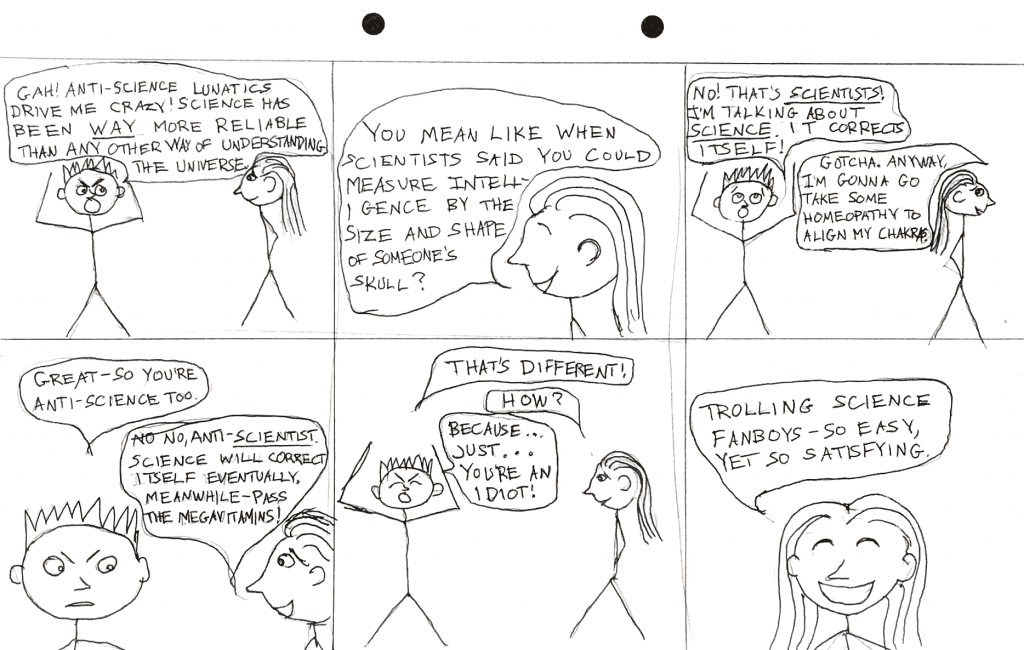About two weeks ago, I went on a one-day low-carb diet. It was not out of any affinity for Dr. Atkins or Tim Noakes or my palaeolithic ancestors. Instead, I was intentionally starving my body of carbohydrates so that the next day I could be injected with a radioactive sugar and then lie in a machine that would take three-dimensional internal scans of my body and monitor the gamma-ray emissions from the sugar to detect whether any parts of my body were absorbing it at an inordinate rate, which would indicate fast-growing cells, such as cancerous cells. Fortunately, none were, and the Hodgkin’s lymphoma that I had in 2009 has officially been in remission for 6 years.
I love science. The unbelievable medical advances brought about by careful application of the scientific method have saved my life many times over. Besides that, it’s just cool. The careful observation and testing, the constant quest for better knowledge – that’s exciting to me. I think the scientific method has proven to be the best way to collect, assess, and build on human experience and observation. Which is why I get annoyed when people set up experience and science as antagonistic to one another. Hence the first comic I drew above.
On the other hand I do understand that attitude toward science, because science defenders have a tendency to overstate their case. The fact that there is not yet any evidence for something does not imply that it’s not real; it could just mean more testing is needed. (I love the website cochrane.org, which collates scientific research on medical treatments; one of my favourite things is that so many of the articles conclude that there is no conclusion and more study is needed.) Despite this, claims of an experience that has not been verified by scientific study are often dismissed as “anti-scientific,” even by people who should know better – who know that science’s strength lies in its lack of certainty. As one of my friends commented on Facebook in response to the second comic above, “[Science] only survives on the ability to reject previously established scientific facts when new evidence presents itself. So as soon as someone says ‘since this is a scientific fact, no one can argue against it,’ science turns into dogma, and is no longer science at all.”
To give a specific example: for a lot of scientifically-minded folks, there’s nothing more infuriating than someone saying something like, “macro-evolution is only a theory.” The typical vociferous reaction that gets comes in response to the implication that a scientific theory is just one guess among many, no different from an un-investigated opinion. And yet if in their response someone raises the theory of evolution to the level of unquestionable fact, they are being unscientific – in the end, it is only a theory, as falsifiable as any other, despite good evidence for it.
So while in theory many science fans differentiate between the scientific method and current scientific theory, I find that practically they often conflate the two, and as a result end up placing way too much faith in current theories and hypotheses. This year seems to be the year for scientists to emphasise just how unreliable experimental results and theories can be: there have been reports on massive un-reproducibility in both hard sciences and psychology, with the most recent and widely reported one being a survey finding that fewer than 1 in 3 psychological experiments is reproducible. There’s been debate about whether these studies simply reflect the way science is supposed to work, or if they reflect an unhealthy bias toward engineering positive results, or some of both. Either way, no one is disputing that lots of published studies have un-reproducible results.
That’s true in every field of science. In my opinion, there’s even more trouble with applied psychology in particular. It’s relatively easy to say “ABVD chemotherapy correlates with reduction in tumours in 80% of cases of Hodgkin’s lymphoma.” But psychology and social science rely on subjective measures like self-reported satisfaction levels and values that end up being remarkably slippery and hard to define: concepts like “human flourishing,” “emotional wellbeing,” even “pleasure” and “pain.” And given the rapidity with which psychological consensus has changed and continues to change over the last 50 years (which has aligned suspiciously well with cultural and political pressure), is there any reason at all to think that 100 years from now psychology’s opinion on what constitutes wellbeing will be anything close to what it is now?
And yet this strange myopia exists – a clear ability to see the flaws of past theories as an expected part of scientific development, but an almost religious acceptance of today’s theories, as if now we’ve gotten things right.
I notice this particularly among fans of the so-called new atheists, who aren’t particularly new anymore (confession: I haven’t read much in the new atheists themselves). In my opinion, the logical conclusion of atheism is not scientism, and it is certainly not the staid moralism of the new atheists. It is rather the anarchistic nihilism of Nietzsche, the absurdism of Sartre and Camus (another confession: I’ve read more of these guys than I have of the new atheists, but still not a lot). The new atheism has far too much certainty. But that’s human nature and human necessity: to get anything done, we have to rest on a lot of assumptions about the way the world works, assumptions that are unproven or unprovable. The mistake that a lot of materialists make, I think, is to think that even if their assumptions could theoretically be falsified, there’s at least a 99% chance that they won’t be. That degree of confidence is misplaced. It’s exactly the kind of confidence a Newtonian physicist might have had before Einstein pulled the rug out from under him.
So, we have a choice: either we functionally place our ultimate faith in tenets that we know to be as likely false as true – the absurdity of absurdism – or we choose to place our faith in tenets that claim to be absolute truth from outside of nature. The latter may seem absurd to a materialist, but I think that this is only an indication that they really haven’t thought through the absurdity of their own position. The latter position is no more absurd than the former, and it has the advantage of *possibly* being based on something other than the arbitrary valuation of the individual.
I happen to believe in the latter option – particularly that the Old and New Testaments, as well as the theological works of Emanuel Swedenborg are revealed truth. I’ve written elsewhere how I came to that belief. From where I stand now, I think this belief leads to a clearer sight of reality and a deeper experience of joy and purpose than a strictly skeptical viewpoint – in Swedenborgian terms, the former view (doubting everything) “leads to all folly and insanity,” while the latter view (trusting God’s Word) “leads to all intelligence and wisdom.” That’s me and my experience. And here’s where I actually agree with the “experience” guy in the first comic. I don’t know that science is capable of accurately measuring comparing that sense of depth and meaning between two individuals, and in particular, I don’t think science is able to make the value judgment that an individual must make about the different kinds of joy they experience, the qualitative differences between different kinds of pleasure, the different senses of purpose people have. Science is awesome, but unless a person has something other than science as the foundation for value judgments and a sense of purpose, they’re standing on quicksand. They’re asking science to bear a load it can’t carry, and was never intended to.













